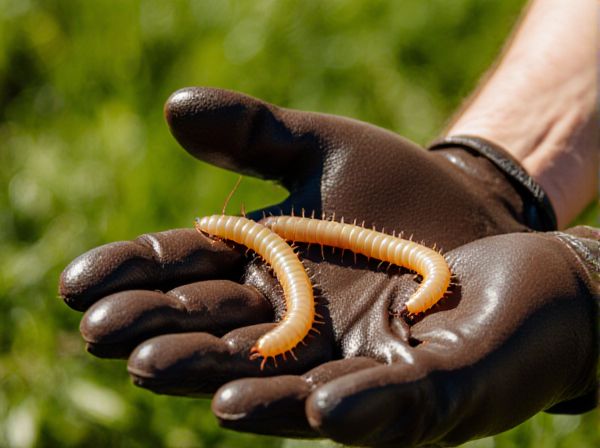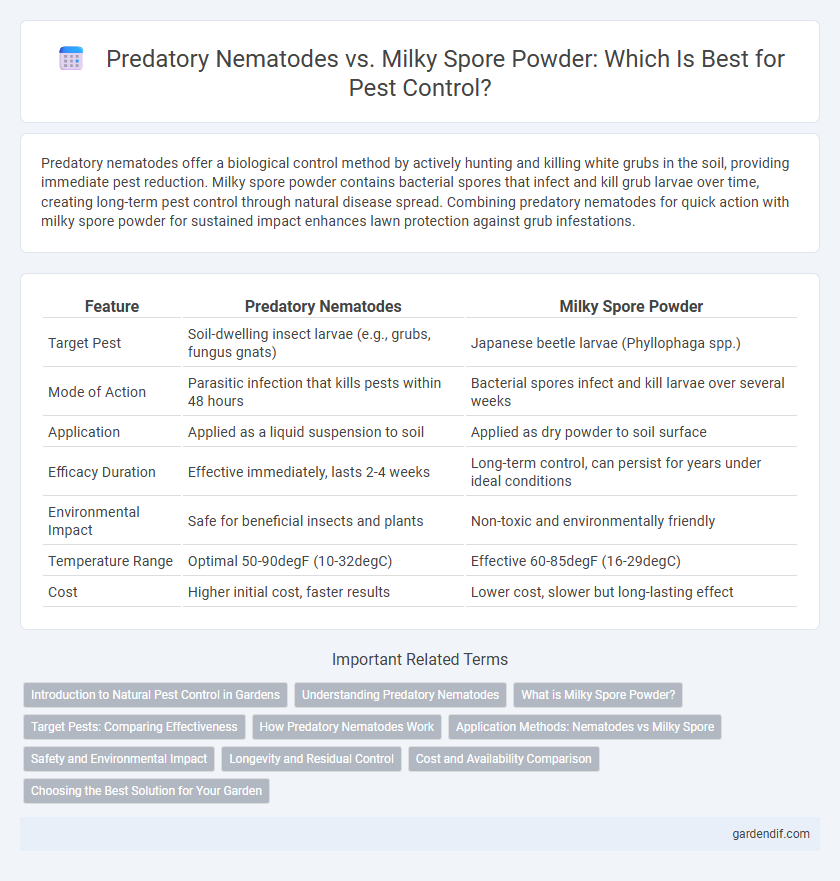
Predatory nematodes vs milky spore powder Illustration
Predatory nematodes offer a biological control method by actively hunting and killing white grubs in the soil, providing immediate pest reduction. Milky spore powder contains bacterial spores that infect and kill grub larvae over time, creating long-term pest control through natural disease spread. Combining predatory nematodes for quick action with milky spore powder for sustained impact enhances lawn protection against grub infestations.
Table of Comparison
| Feature | Predatory Nematodes | Milky Spore Powder |
|---|---|---|
| Target Pest | Soil-dwelling insect larvae (e.g., grubs, fungus gnats) | Japanese beetle larvae (Phyllophaga spp.) |
| Mode of Action | Parasitic infection that kills pests within 48 hours | Bacterial spores infect and kill larvae over several weeks |
| Application | Applied as a liquid suspension to soil | Applied as dry powder to soil surface |
| Efficacy Duration | Effective immediately, lasts 2-4 weeks | Long-term control, can persist for years under ideal conditions |
| Environmental Impact | Safe for beneficial insects and plants | Non-toxic and environmentally friendly |
| Temperature Range | Optimal 50-90degF (10-32degC) | Effective 60-85degF (16-29degC) |
| Cost | Higher initial cost, faster results | Lower cost, slower but long-lasting effect |
Introduction to Natural Pest Control in Gardens
Predatory nematodes serve as an effective biological control by parasitizing soil-dwelling pests like grubs and root maggots, promoting a healthier garden ecosystem. Milky spore powder specifically targets Japanese beetle larvae, gradually reducing pest populations by infecting and killing the grubs over time. Integrating these natural pest control methods enhances soil health and minimizes the need for chemical pesticides in sustainable gardening practices.
Understanding Predatory Nematodes
Predatory nematodes are microscopic roundworms that actively hunt and consume pest larvae, offering a natural biological control solution for soil-dwelling insect pests such as grubs. These beneficial nematodes penetrate their hosts, releasing symbiotic bacteria that rapidly kill the pest, making them efficient in reducing root-damaging insect populations. Unlike milky spore powder, which targets specifically Japanese beetle larvae over time, predatory nematodes provide broader pest control against various soil pests with faster results.
What is Milky Spore Powder?
Milky Spore Powder is a biological pest control agent containing spores of the bacterium Paenibacillus popilliae, which specifically targets Japanese beetle larvae in the soil. This powder infects and kills grubs, reducing beetle populations without harming beneficial insects or the environment. Unlike predatory nematodes, which actively hunt pests, Milky Spore Powder relies on natural bacterial infection to suppress beetle larvae over time.
Target Pests: Comparing Effectiveness
Predatory nematodes effectively target soil-dwelling pests such as grubs, fungus gnats, and root weevils by actively seeking and parasitizing larvae, providing rapid pest control. Milky spore powder specifically targets Japanese beetle larvae, offering long-term pest suppression through bacterial infection but with slower initial results. Combining these biological controls can enhance pest management by covering a broader range of subterranean insects and life stages.
How Predatory Nematodes Work
Predatory nematodes actively seek out and infect soil-dwelling pests by entering their hosts through natural body openings and releasing symbiotic bacteria that kill the pest within 24 to 48 hours. These microscopic roundworms reproduce inside the pest, releasing new nematodes into the soil to continue the cycle of biological control. Their targeted approach offers an environmentally friendly alternative to chemical pesticides, effectively reducing grub populations and other harmful insects in lawns and gardens.
Application Methods: Nematodes vs Milky Spore
Predatory nematodes require application as a soil drench or spray during cooler, moist conditions to ensure they enter the soil and actively seek out pests like grubs. Milky spore powder is typically spread evenly over the turf surface and watered in to facilitate spore penetration into the soil, targeting grub larvae over a longer period. Precise timing and soil moisture levels are critical for nematodes, while milky spore's effectiveness builds gradually with repeated applications and host insect presence.
Safety and Environmental Impact
Predatory nematodes offer a targeted biological control by specifically attacking soil-dwelling pests without harming beneficial insects or plants, ensuring minimal ecological disruption. Milky spore powder, while effective against Japanese beetle larvae, can persist in soil for years, potentially impacting non-target beetle species and altering soil microbial communities. Both methods provide safer alternatives to chemical pesticides, but predatory nematodes generally exhibit a more favorable environmental safety profile due to their specificity and biodegradability.
Longevity and Residual Control
Predatory nematodes provide immediate pest control with effectiveness lasting up to several weeks, relying on active movement to hunt larvae, which limits their longevity in soil environments. Milky spore powder offers long-term residual control by introducing spores that multiply within targeted pest populations, maintaining pest suppression for up to 10 to 15 years under favorable soil conditions. The sustained presence of milky spore makes it a preferred choice for lasting lawn and garden pest management compared to the shorter-lived impact of predatory nematodes.
Cost and Availability Comparison
Predatory nematodes typically involve higher initial costs but provide rapid pest control, with availability varying seasonally due to their living nature. Milky spore powder offers a more affordable and long-lasting solution, commonly available year-round and effective against Japanese beetle larvae. Selecting between these options depends on budget constraints and immediate pest management needs.
Choosing the Best Solution for Your Garden
Predatory nematodes target soil-dwelling pest larvae, offering a biological control method that actively hunts and destroys grubs without harming beneficial insects. Milky spore powder uses a bacterium to infect and kill Japanese beetle larvae, providing a long-lasting and specific solution that improves over several years. Selecting the best solution depends on garden pest types, desired speed of results, and whether immediate or sustained pest control is prioritized.
Predatory nematodes vs milky spore powder Infographic

 gardendif.com
gardendif.com